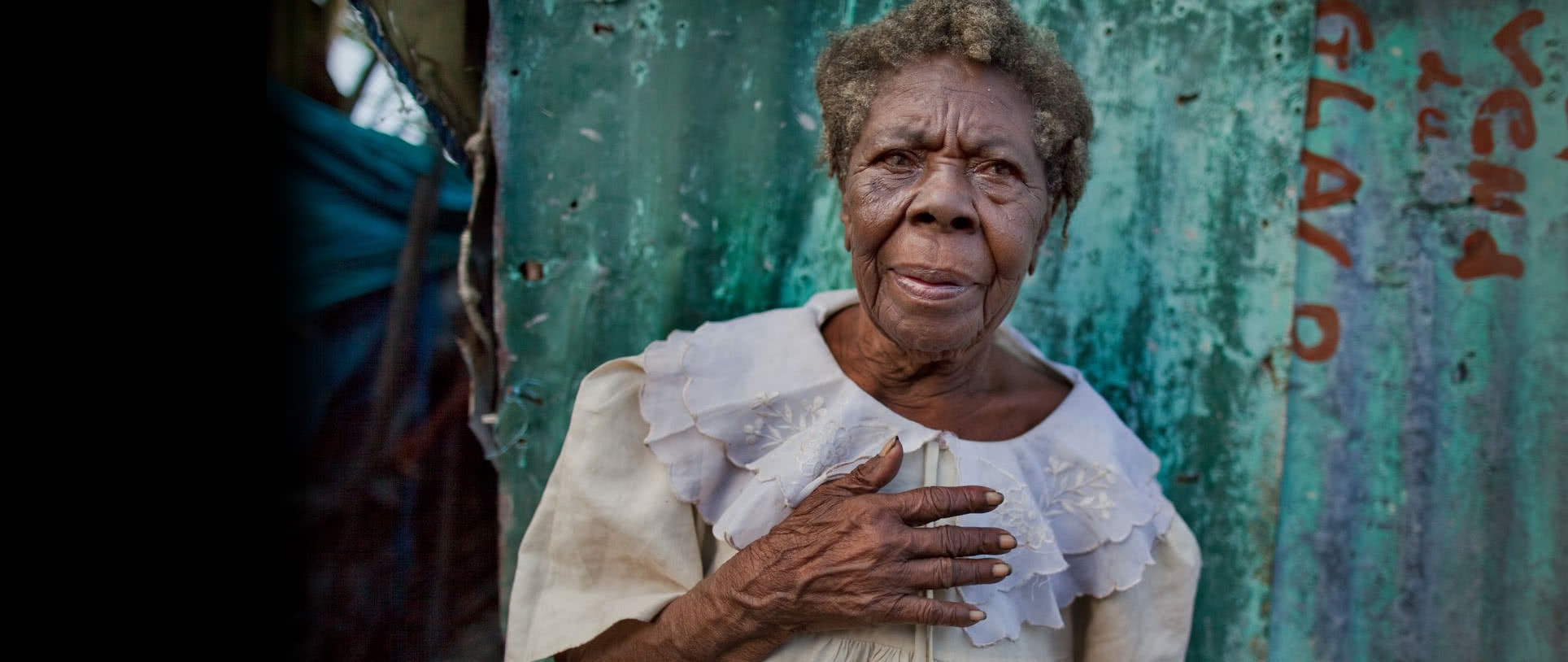CARE has worked in Haiti, providing emergency support and sustainable programs, since 1954.
CARE started operations in Haiti in 1954 with emergency response interventions. Since then, we have continuously expanded our programs to include diverse development projects as well as respond to the growing food crisis and COVID-19. Through our work over those years, CARE’s local teams have gained a wealth of experience and skills and are well-placed to lead the response to the 2021 earthquake, as well as focus on long-term recovery and development goals.
In October 2016, the Category Four Hurricane Matthew slammed into Haiti bringing devastating 230-kilometre-per-hour winds and heavy rainfall.
CARE’s emergency teams were on the ground before the hurricane hit, helping to evacuate the most vulnerable from areas at extreme risk of storm surges and landslides. We deployed teams to remote and hard-to-reach areas, who pre-positioned vital supplies, such as clean drinking water, hygiene kits, tarps and blankets, to help communities weather the storm.
A nation already suffering from intense poverty, Haiti is still rebuilding following the massive earthquake that hit in 2010. One of the worst disasters in modern history, over 220,000 people were killed and another 300,000 injured.
CARE responded immediately to the earthquake crisis, providing food, shelter, clean water, sanitation and medical care to those most in need. Where emergencies strike we continue to help people rebuild their lives and restore their livelihoods in the years following the event.
Your donations could help us provide essential supplies to families in Haiti.
Fast Facts
Population: 10.49 million
Life expectancy: 63.8 years (61.2 years male, 66.4 years female) (2016 est.)
Infant mortality: 48.2 deaths/1,000 live births (2016 est.)
Under-5 mortality*: 69 deaths/1,000 live births (2015 est.)
Maternal mortality: 359 deaths/100,000 live births (2015 est.)
Adult literacy rate: 60.7% (64.3% male, 57.3% female) (2015 est.)
Access to improved drinking water: 57.7% (64.9% urban, 47.6% rural)
Access to improved sanitation: 27.6% (33.6% urban, 19.2% rural)
Labour force participation rate^: 71% male, 61% female (2014 est.)
Percentage of seats held by women in national parliament^: 0%
GDP per capita: $1,800 (2015 est.)
Source: CIA World Factbook, *UNICEF, ^World Bank
Haiti Earthquake Emergency
Haiti is still reeling from the devastating 7.2 magnitude earthquake that hit the south of the island in the early hours of Saturday 14 August 2021, killing hundreds and injured thousands.
Fortunately, CARE was already working near the epicentre of the earthquake, and our local teams distributed tents, water and basic relief items to thousands of survivors in Grand Anse.
Lora Wuennenberg, CARE Haiti Interim Country Director:
“All CARE staff are safe and accounted for and we have already begun assessments of the impact to see how we can best respond. Even in Port-au-Prince – where I am based – we felt strong tremors this morning. Our thoughts are with all those who have lost lives and loved ones. This latest disaster comes on top of compounding crises, including a worsening food crisis that has left almost half the population (around 4 million people) facing severe hunger and in need of humanitarian assistance. This latest earthquake – which is actually recorded as higher than the 2010 earthquake that killed hundreds of thousands – is likely to significantly worsen this situation for an already struggling nation.”
The earthquake has struck when half of Haiti’s population (around 4 million people) are already struggling to feed themselves and their families. Support from the international community has been vital to ensure those who were already hungry, and have now lost everything, could survive this disaster.
Eleven years on from the Haiti 2010 earthquake
In the eleven years that followed the earthquake, CARE worked with communities to:
- deliver life-saving food, water, shelter and other vital services to more than 290,000 Haitians
- provide 1.1 million cubic metres of chlorinated water to more than half a million people
- reach over 183,000 people with electronic food vouchers totaling $7.8 million benefitting local economies
- provide nearly 40,000 children with school kits and 741 teacher kits to quickly get children back in the classroom.
Donate now
Support our ongoing work to create a more equal world.
Your donation can help end extreme poverty and give people the means to build a better future for themselves in countries like Haiti.
For those living in extreme poverty, your support brings education and training, healthcare and clean water, nutritious food, and new ways to earn an income. And in times of crisis, you help us deliver emergency relief. Please donate today.

